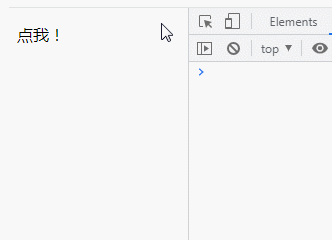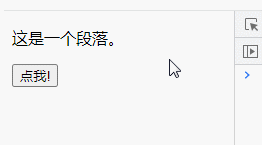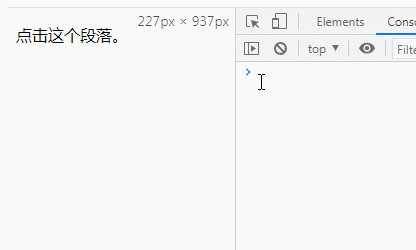What are the ways to monitor jquery events?
jQuery provides four event monitoring methods: 1. Using bind(), you can add one or more event handlers to the selected element and set the event processing function; 2. Use live(), You can add one or more event handlers to the current or future matching elements and set the processing function; 3. Using delegate(), you can add one or more event handlers for the specified element (belonging to the child elements of the selected element) Program; 4. Using on(), you can add one or more event handlers on the selected element and sub-elements.

The operating environment of this tutorial: windows7 system, jquery3.6 version, Dell G3 computer.
jQuery provides a variety of ways to bind events. Each method has its own characteristics. Understanding the similarities and differences between them will help us make the right choice when writing code, so as to write Produce elegant and easy-to-maintain code. Let's take a look at the ways to bind events in jQuery.
jQuery provides four event monitoring methods, namely bind, live, delegate, and on. The corresponding functions to unblock the monitoring are unbind, die, undelegate, and off
1. blind
Definition and usage: Add one or more event handlers to the selected element and specify the function to run when the event occurs.
Grammar:
$(selector).blind("事件类型",data,function(){});
//data是传入函数的参数用event.data获取(平时用的.click()等都是其简化用法)Features
Applicable to static pages. It can only be bound to elements that already exist when it is called, and cannot be bound to new ones in the future. Added element binding
will only be blinded when the page is loaded;
Example:
<!DOCTYPE html>
<html>
<head>
<meta charset="utf-8" />
<script src="./js/jquery-3.6.0.min.js"></script>
<script>
$(document).ready(function() {
$("p").bind("click", function() {
console.log("这个段落被点击了。");
});
});
</script>
</head>
<body>
<p>点我!</p>
</body>
</html>
2, live
Definition: Add one or more event handlers to the current or future matching elements;
Syntax:
live("事件类型",data, 函数名);//data可选Features: live does not bind the event to itself (this), but to this.context
It uses the event delegation mechanism to complete the monitoring and processing of events. The processing of the node is entrusted to the document
The newly added element does not need to be bound to a listener again and can be processed with multiple events
It can only be placed behind the directly selected element
<!DOCTYPE html>
<html>
<head>
<meta charset="utf-8" />
<script src="./js/jquery-1.7.2.min.js"></script>
<script>
$(document).ready(function() {
$("button").live("click", function() {
$("p").slideToggle();
});
});
</script>
</head>
<body>
<p>这是一个段落。</p>
<button>点我!</button>
<br><br>
</body>
</html>
Note: The live() method was deprecated in jQuery version 1.7 and removed in version 1.9. Please use the on() method instead.
3. delegate
delegate() method adds one or more event handlers to the specified element (belonging to the child elements of the selected element) and stipulates that when Functions that are run when these events occur.
Event handlers using the delegate() method apply to the current or future elements (such as new elements created by scripts).
Syntax:
delegate(selector,type,[data],fn)
Features: More precise use of event proxies in a small range, performance better than .live(). Can be used on dynamically added elements.
("父级选择器").delegate(".a","click",function())//表示:.a的事件通过父级元素进行委托,(this)获取的是触发事件的子元素Example: When clicking the
element inside the
elements
<!DOCTYPE html>
<html>
<head>
<meta charset="utf-8" />
<script src="./js/jquery-3.6.0.min.js"></script>
<script>
$(document).ready(function() {
$("div").delegate("p", "click", function() {
$("p").css("background-color", "pink");
});
});
</script>
</head>
<body>
<div style="background-color:yellow">
<p>这个段落在 div 元素内。</p>
</div>
<p>这是一个段落。</p>
</body>
</html>
4, on
Definition: Bind the listening event to the nearest parent element
Syntax:
on(type, 选择器,方法)
Features:
You can also use event listening for newly added tags under the parent element
It also supports multi-time event processing
Example:
<!DOCTYPE html>
<html>
<head>
<meta charset="utf-8" />
<script ></script>
<script>
$(document).ready(function() {
$("p").on("click", function() {
console.log("段落被点击了。");
});
});
</script>
</head>
<body>
<p>点击这个段落。</p>
</body>
</html>
[Recommended learning: jQuery video tutorial, web front-end video]
The above is the detailed content of What are the ways to monitor jquery events?. For more information, please follow other related articles on the PHP Chinese website!

Hot AI Tools

Undresser.AI Undress
AI-powered app for creating realistic nude photos

AI Clothes Remover
Online AI tool for removing clothes from photos.

Undress AI Tool
Undress images for free

Clothoff.io
AI clothes remover

Video Face Swap
Swap faces in any video effortlessly with our completely free AI face swap tool!

Hot Article

Hot Tools

Notepad++7.3.1
Easy-to-use and free code editor

SublimeText3 Chinese version
Chinese version, very easy to use

Zend Studio 13.0.1
Powerful PHP integrated development environment

Dreamweaver CS6
Visual web development tools

SublimeText3 Mac version
God-level code editing software (SublimeText3)

Hot Topics
 Detailed explanation of jQuery reference methods: Quick start guide
Feb 27, 2024 pm 06:45 PM
Detailed explanation of jQuery reference methods: Quick start guide
Feb 27, 2024 pm 06:45 PM
Detailed explanation of jQuery reference method: Quick start guide jQuery is a popular JavaScript library that is widely used in website development. It simplifies JavaScript programming and provides developers with rich functions and features. This article will introduce jQuery's reference method in detail and provide specific code examples to help readers get started quickly. Introducing jQuery First, we need to introduce the jQuery library into the HTML file. It can be introduced through a CDN link or downloaded
 How to use PUT request method in jQuery?
Feb 28, 2024 pm 03:12 PM
How to use PUT request method in jQuery?
Feb 28, 2024 pm 03:12 PM
How to use PUT request method in jQuery? In jQuery, the method of sending a PUT request is similar to sending other types of requests, but you need to pay attention to some details and parameter settings. PUT requests are typically used to update resources, such as updating data in a database or updating files on the server. The following is a specific code example using the PUT request method in jQuery. First, make sure you include the jQuery library file, then you can send a PUT request via: $.ajax({u
 In-depth analysis: jQuery's advantages and disadvantages
Feb 27, 2024 pm 05:18 PM
In-depth analysis: jQuery's advantages and disadvantages
Feb 27, 2024 pm 05:18 PM
jQuery is a fast, small, feature-rich JavaScript library widely used in front-end development. Since its release in 2006, jQuery has become one of the tools of choice for many developers, but in practical applications, it also has some advantages and disadvantages. This article will deeply analyze the advantages and disadvantages of jQuery and illustrate it with specific code examples. Advantages: 1. Concise syntax jQuery's syntax design is concise and clear, which can greatly improve the readability and writing efficiency of the code. for example,
 jQuery Tips: Quickly modify the text of all a tags on the page
Feb 28, 2024 pm 09:06 PM
jQuery Tips: Quickly modify the text of all a tags on the page
Feb 28, 2024 pm 09:06 PM
Title: jQuery Tips: Quickly modify the text of all a tags on the page In web development, we often need to modify and operate elements on the page. When using jQuery, sometimes you need to modify the text content of all a tags in the page at once, which can save time and energy. The following will introduce how to use jQuery to quickly modify the text of all a tags on the page, and give specific code examples. First, we need to introduce the jQuery library file and ensure that the following code is introduced into the page: <
 How to remove the height attribute of an element with jQuery?
Feb 28, 2024 am 08:39 AM
How to remove the height attribute of an element with jQuery?
Feb 28, 2024 am 08:39 AM
How to remove the height attribute of an element with jQuery? In front-end development, we often encounter the need to manipulate the height attributes of elements. Sometimes, we may need to dynamically change the height of an element, and sometimes we need to remove the height attribute of an element. This article will introduce how to use jQuery to remove the height attribute of an element and provide specific code examples. Before using jQuery to operate the height attribute, we first need to understand the height attribute in CSS. The height attribute is used to set the height of an element
 Use jQuery to modify the text content of all a tags
Feb 28, 2024 pm 05:42 PM
Use jQuery to modify the text content of all a tags
Feb 28, 2024 pm 05:42 PM
Title: Use jQuery to modify the text content of all a tags. jQuery is a popular JavaScript library that is widely used to handle DOM operations. In web development, we often encounter the need to modify the text content of the link tag (a tag) on the page. This article will explain how to use jQuery to achieve this goal, and provide specific code examples. First, we need to introduce the jQuery library into the page. Add the following code in the HTML file:
 Understand the role and application scenarios of eq in jQuery
Feb 28, 2024 pm 01:15 PM
Understand the role and application scenarios of eq in jQuery
Feb 28, 2024 pm 01:15 PM
jQuery is a popular JavaScript library that is widely used to handle DOM manipulation and event handling in web pages. In jQuery, the eq() method is used to select elements at a specified index position. The specific usage and application scenarios are as follows. In jQuery, the eq() method selects the element at a specified index position. Index positions start counting from 0, i.e. the index of the first element is 0, the index of the second element is 1, and so on. The syntax of the eq() method is as follows: $("s
 How to tell if a jQuery element has a specific attribute?
Feb 29, 2024 am 09:03 AM
How to tell if a jQuery element has a specific attribute?
Feb 29, 2024 am 09:03 AM
How to tell if a jQuery element has a specific attribute? When using jQuery to operate DOM elements, you often encounter situations where you need to determine whether an element has a specific attribute. In this case, we can easily implement this function with the help of the methods provided by jQuery. The following will introduce two commonly used methods to determine whether a jQuery element has specific attributes, and attach specific code examples. Method 1: Use the attr() method and typeof operator // to determine whether the element has a specific attribute






